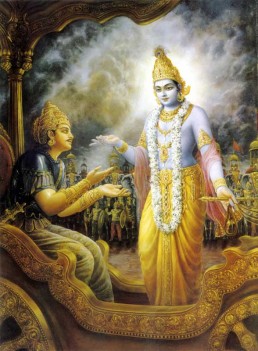Swami Chinmayananda
Swami Chinmayananda Commentary
The whole Vedic concept of Devas is that of one Universal Power, ever active in the world of phenomena, receiving appropriate names because of Its multiple functions. All Vedic gods are but functional names of the one Supreme Creative Power manifesting in myriad forms.
In understanding the stanza in its more universal application, we have to interpret the term Deva as the very “presiding deity” in any field of activity, who blesses the worker in that field with his profit. The deity that blesses the worker in a field of activity can be nothing other than “THE PRODUCTIVE POTENTIAL” in that given field. When we apply in any situation our true and sincere work, the efforts and sacrifices so made, as it were, invoke the ‘PRODUCTIVE POTENTIAL’ in that situation, which comes to manifest and bless the worker. This becomes obvious when we try to understand what we, in the modern world mean, when we say Mother India. In thus symbolising the might of a nation we mean the ‘PRODUCTIVE POTENTIAL” of that country in all her spheres of activities.
It is obvious that the productivity that is dormant in any situation can be invoked only by man’s sincere efforts. This potential which generally lies dormant everywhere is the Deva to be cherished by the worker through the Yajna activities, and certainly the Deva will manifest itself to cherish, or to bless the worker. “Thus cherishing one another, man shall gain the Highest Good,” is the Divine intention in the mind of the creator, says Krishna in this stanza.
The Law-of-Seva is faithfully followed by every sentient and insentient member of the cosmos instinctively. Man alone is given the freedom to act as he likes and to the extent he disobeys this Universal Law-of-Sacrifice, Yajna, to that extent he comes to suffer, because he, with his arrogant and egoistic actions, brings discord in the harmony of the existence around him.
MOREOVER:
Adi Sankara Commentary
‘Bhavayata, you nourish; devan, the gods, Indra and others; anena, with this sarifice. Let te devah, those gods; bhavayantu, nourish; vah, you-make you contented with rainfall etc. Thus bhavayantah, nourishing; parasparam, one another; avapsyatha, you shall attain; the param, supreme; sreyah, Good, called Liberation, through the attainment of Knowledge;’ or, ‘you shall attain heaven-which is meant by param ‘sreyah.’ [The param sreyah (supreme Good) will either mean liberation or heaven in accordance with aspirant’s hankering for Liberation or enjoyment.] Moreover,
The Bhagavad Gita with the commentary of Sri Sankaracharya – Translated by Alladi Mahadeva Sastry
Holy Geeta – Commentary by Swami Chinmayananda
The Bhagavad Gita by Eknath Easwaran – Best selling translation of the Bhagavad Gita
The Bhagavad Gita – Translation and Commentary by Swami Sivananda
Bhagavad Gita – Translation and Commentary by Bhaktivedanta Swami Prabupadha
Srimad Bhagavad Gita Chapter 3 – Verse 11 – 3.11 devan bhavayatanena – All Bhagavad Gita (Geeta) Verses in Sanskrit, English, Transliteration, Word Meaning, Translation, Audio, Shankara Bhashya, Adi Sankaracharya Commentary and Links to Videos by Swami Chinmayananda and others – 3-11

